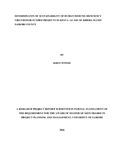| dc.description.abstract | For Kenya to win the war against Human Immunodeficiency Virus it needs to focus on sustaining the projects initiated by donors in light of scarce resources attributed to both global recession and the high burden H.I.V and A.I.D.S has placed on the government. It is worth noting that H.I.V and A.I.D.S projects are largely dependent upon funding by donors and this necessitates the need for resource maximization to ensure sustainability of the project. Human Immuno Deficiency Virus remains a major challenge in Kibera and Centre for Disease Control estimates the rate of infection to be over 20% and its in this background of this that this research sought to focus on Determinants of sustainability of Human Immuno Deficiency Virus donor funded projects in Nairobi county ,Kenya: a case of Kibera slums.The research was guided by four objectives, to determine the influence of community participation on sustainability of H.I.V and A.I.D.S projects ,to examine the influence of monitoring and evaluation on sustainability of H.I.V and A.I.D.S projects, to establish the influence of institutional environment on sustainability of H.I.V. and A.I.D.S projects and to assess the influence of project resources on sustainability of H.I.V and A.I.D.S projects. Literature reviewed defines sustainability as the continuation of benefits after major assistance from a donor has been completed and this is accurately captures the main reason for engaging in this study and explore the concept of sustainability. The study used descriptive research design in collecting the data from respondents. The design was justified for this study because it enabled the researcher to get details by analyzing the objects of study by asking questions such as who, how, what, which and when. It also provided description of the situation, thus limiting the level of biasness in the collection of data and an eventual reduction of errors in interpreting the data collected .The study used Krejcien and Morgan table to determine the sample size from the donor funded projects operating in Kibera. Respondents for the study were drawn from the target population and consisted of a project managers, project coordinators, finance managers and project officers drawn from organizations dealing with H.IV and A.I.D.S, making it a total of ninety two (92). Quantitative data which was collected using closed ended questions in the questionnaires was cleaned and tabulated. The tabulated data was analyzed using correlation and regression with the aid of SPSS 21. The regression model was used to determine if there is a relationship between dependent and independent variables. Out of the 120 distributed questionnaires, 100 we returned. The found that sustainability can only be achieved when the community is fully involved in all aspects of the project, monitoring and evaluation can not be divorced from sustainable projects.There is need to scale up monitoring and evaluation to enhance evidence based programs. Organizations should embrace and support efforts to building strong monitoring and evaluation systems including availing resources needed. Projects can only thrive in a stable political environment and this is seen to be a major factor in sustainability because projects can only exist in areas where there are proper structures. On funding and sustainability, alternative sources of funding should be explored to ensure beneficiaries are not affected upon donor exist. The study recommended community involvement because projects initiated based on needs assessment have greater chances of succeeding. There is need for donor involvement in monitoring and evaluation to ensure every funded project has a clear sustainability plan not just on proposal level but in implementation. Projects linked to government priorities have greater chances of sustainability. Funding should be increased by both the national and county government to support sustainability efforts bearing in mind the devolved health function. | en_US |



